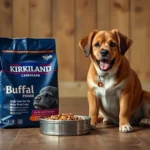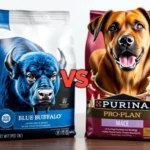
Understanding dog nutrition is essential for every pet owner. A balanced diet not only helps your dog maintain a healthy weight but also supports their overall well-being and longevity. As responsible pet parents, it’s crucial to know which foods are safe for our canine companions. One question that often arises is, can dogs eat cornbread? This article will explore the safety, nutritional value, and potential risks of feeding cornbread to dogs, along with some alternatives to consider.
Understanding Dog Nutrition
Basic Nutritional Needs
Dogs require a balanced diet comprising macronutrients and micronutrients.
- Proteins are vital for growth, repair, and maintenance of body tissues. They’re essential for muscle development, immune function, and hormone production.
- Fats serve as a concentrated energy source and are crucial for cellular function. They also help absorb fat-soluble vitamins (A, D, E, K).
- Carbohydrates provide energy and support digestive health. While dogs can utilize carbohydrates for energy, they are not as critical as proteins and fats.
In addition to macronutrients, micronutrients such as vitamins and minerals play significant roles in various bodily functions. For instance, calcium and phosphorus are essential for bone health, while vitamins A and E support vision and skin health, respectively.
Common Dietary Requirements for Dogs
Nutritional needs can vary significantly based on a dog’s age, breed, and health status.
- Puppies require a diet high in protein and fat to support their rapid growth and development.
- Adult dogs generally need a balanced diet that maintains their energy levels and overall health.
- Senior dogs may benefit from a diet lower in calories but enriched with joint-supporting nutrients due to age-related health issues.
Certain breeds may also have specific dietary considerations. For example, large breeds might need controlled calcium levels to prevent skeletal disorders, while small breeds may require more calorie-dense foods due to their higher metabolism.
Consequences of Poor Nutrition
Feeding your dog an unbalanced diet can lead to serious health risks.
- Obesity can result from excessive calorie intake and inadequate exercise, leading to various health problems like diabetes and joint issues.
- Nutritional deficiencies can cause a range of issues, including poor coat condition, lethargy, and increased susceptibility to infections.
Common signs of nutritional deficiencies in dogs include:
- Dry, flaky skin
- Dull or brittle coat
- Weight loss or gain
- Lethargy and decreased activity levels
Introduction to Cornbread
What is Cornbread?
Cornbread is a popular baked good made primarily from cornmeal, which is a finely ground corn product. The basic ingredients include cornmeal, flour, eggs, milk, and baking powder. Variations may incorporate additional ingredients like cheese, jalapeños, or herbs, creating a unique flavor profile.
Nutritional Profile of Cornbread
A typical serving of cornbread provides a decent amount of carbohydrates and some protein but is relatively low in essential vitamins and minerals. Here’s a breakdown of key nutrients found in cornbread:
- Carbohydrates: The primary source of energy.
- Protein: Moderate amounts for muscle maintenance.
- Fat: Depending on the recipe, it can be low to moderate.
- Vitamins and Minerals: Some B vitamins and iron, but not a comprehensive source of essential nutrients.
When compared to other common dog treats, cornbread generally contains more carbohydrates and less nutritional value, making it less ideal as a regular treat for dogs.
Can Dogs Eat Cornbread?
Safety Considerations
So, can dogs eat cornbread? The short answer is yes, but with caution. Cornbread can be safe for dogs in small amounts, provided it doesn’t contain harmful ingredients. However, it’s essential to keep in mind potential allergens.
- Corn: Some dogs may be allergic to corn, which can lead to gastrointestinal upset or skin reactions.
- Dairy: If the cornbread recipe includes milk or cheese, watch out for lactose intolerance, which is common in dogs.
Benefits of Feeding Cornbread to Dogs
Feeding cornbread as an occasional treat can offer some benefits:
- Energy Source: The carbohydrates in cornbread can provide a quick energy boost for active dogs.
- Taste: Many dogs enjoy the taste of cornbread, making it a delightful treat for training sessions or special occasions.
Risks and Precautions
While cornbread can be safe for dogs, there are several risks to consider:
- Digestive Issues: Some dogs may experience bloating, gas, or diarrhea after consuming cornbread, especially if they are not used to grains.
- Serving Size: Moderation is key. A small piece of cornbread occasionally is acceptable, but it should not replace a balanced diet.
- Signs of Adverse Reactions: Watch for symptoms like vomiting, diarrhea, or signs of discomfort after feeding cornbread. If these occur, discontinue feeding and consult your veterinarian.
Alternatives to Cornbread for Dogs
Dog-Friendly Recipes
If you’re looking for healthier alternatives to cornbread, consider making your own dog treats. Here are a couple of simple recipes:
- Pumpkin Peanut Butter Treats:
- Ingredients: 1 cup pumpkin puree, 1/2 cup peanut butter, 2 cups whole wheat flour, 1 egg.
-
Instructions: Mix all ingredients, roll out the dough, and cut into shapes. Bake at 350°F (175°C) for 20-25 minutes.
-
Sweet Potato Chews:
- Ingredients: 1 large sweet potato.
- Instructions: Slice the sweet potato into thin rounds, bake at 250°F (120°C) for 2-3 hours until dried.
Commercial Dog Treats
If homemade treats aren’t your preference, there are many commercial dog treats available. When selecting treats, look for:
- Natural Ingredients: Avoid treats with artificial flavors, colors, or preservatives.
- Balanced Nutrition: Check for treats that offer additional health benefits, such as dental health or joint support.
- Ingredient Transparency: Choose brands that clearly list their ingredients and nutritional information.
Conclusion
In summary, while dogs can eat cornbread in moderation, it’s essential to consider potential allergens and the nutritional value of this treat. Rather than relying on cornbread as a regular part of your dog’s diet, explore healthier alternatives that can provide both enjoyment and nutritional benefits. Always consult with your veterinarian for personalized advice, especially if you’re unsure about introducing new foods into your dog’s diet.
FAQs
Can puppies eat cornbread?
Puppies have specific nutritional needs, and while a small amount of cornbread might not harm them, it’s best to avoid feeding it to them regularly. Stick to puppy-formulated food that meets their growth and development requirements.
What should I do if my dog eats too much cornbread?
If your dog overeats cornbread, monitor them for any signs of discomfort or digestive issues. Ensure they have access to fresh water, and if symptoms like vomiting or diarrhea occur, contact your veterinarian for guidance.
Are there any specific breeds that should avoid cornbread?
Certain breeds may have dietary restrictions or sensitivities. If your dog is predisposed to food allergies or has a history of digestive issues, it’s advisable to avoid feeding them cornbread and opt for safer treat options.
References
- Veterinary nutritional guidelines
- Canine dietary studies
- Pet nutrition literature









